It is always important to be cautious about giving your dog people food. Many things that humans eat without a second thought can make your dog sick. Some things can even put her life in jeopardy.
But there are also people foods that are perfectly safe for your dog (in moderation). Some foods are even capable of providing health benefits for your four-legged companion.
Pumpkin is a great example – it is full of nutritious things for your pup’s body, it poses no danger to your pet (it actually appears in many commercial dog food ingredient lists), and most dogs find it delicious.
We’ll talk about pumpkin for dogs below and explain what it is about this fall favorite that makes it so good for dogs.
Key Takeaways: Can Dogs Eat Pumpkin?
- Pumpkin is a safe and nutritious people food your pet can enjoy. Like all people foods, it should only be offered in moderation, but a slice or two from time to time is no problemo.
- Don’t feed your dog the stem or skin, just stick to the flesh and seeds. You can cook pumpkin (your dog will probably prefer if you do), but raw pumpkin flesh and seeds are perfectly safe.
- Pumpkin — especially the pureed form — can treat diarrhea in dogs. Just mix a teaspoon to a tablespoon or so in with your dog’s food. The fiber content will help slow down your pup’s gut.
Getting to Know the Pumpkin And What It’s All About
Pumpkins are pretty strange food items.
They’re huge, they’re orange, and they’re mostly hollow.
And the cultural practice of carving them into frightening or funny-looking Jack-o’-lanterns doesn’t make them any less bizarre (carving a face into a fruit, sticking a candle inside it, and then sticking the thing on your porch is just a weird thing to do).
So, let’s talk about the basics.
Pumpkin is treated as a vegetable in many culinary contexts, but it is, in fact, a fruit — anything with seeds is, technically speaking.
Pumpkin is a cultivar (a selectively bred plant variety that usually differs from the natural form) of a plant called Cucurbita pepo. Several other important foods — including summer squash, winter squash, and zucchini — are also cultivars that are derived from the plant.
Perhaps not coincidentally, these are also people foods that are often recommended for dogs.
Unlike some of these other cultivars which could be best described as moderately nutritious, pumpkin is popping with vitamins, minerals, antioxidants, and fiber.
One cup of raw pumpkin contains:
- 2 grams of protein
- 6 grams of fiber
- 8,567 IU (international units) of Vitamin A
- 4 milligrams of Vitamin C
- 2 milligrams of Vitamin E
- 6 micrograms of Folate
- 1 milligrams of Vitamin B6
- 1 milligrams of Riboflavin
- 394 milligrams of Potassium
- 4 milligrams of Zinc
- 1 milligram of Manganese
What Kind of Pumpkin Is Safe for Your Dog?
OK, so now that you know that pumpkin is typically safe – even nutritious – for dogs, you need to know what to do with that giant orange gourd in front of you.
Which parts of the pumpkin are safe for your pet to eat? Can you give it to your dog raw, or do you have to cook it first? What about the seeds? And how do you go about butchering this thing?
I’ll leave the pumpkin-dissection instruction to other corners of the internet (although I’d definitely recommend caution with the knife), but the other questions have pretty straight-forward answers:
- The internal flesh of the pumpkin is the edible part. Don’t give your dog the skin or any portion of the stem. Neither are considered toxic, but they’ll probably come out looking the same as they did going in (your dog won’t digest them), and they could cause blockages or discomfort.
- You can feed your dog raw or cooked pumpkin. Most dogs will probably like cooked pumpkin better, and they’ll probably digest cooked pumpkin more completely. But, if your dog likes raw pumpkin, you don’t need to cook it. If you do cook it, do so in a healthy fashion – bake it or boil it, and don’t add any salt or fat.
- Throw in the seeds too. Just like pumpkin flesh, pumpkin seeds are edible, delicious, and nutritious. In fact, they provide even more fiber than the flesh does, and they are also rich in inflammation-fighting antioxidants. The seeds are perfectly safe in their raw and unshelled state, but they taste much better if you shell ‘em and roast ‘em. Just don’t add any salt or fat as you may do when cooking up your own pumpkin seeds.
- Canned pumpkin puree is a safe and easy form of pumpkin to feed your dog. Just be sure you don’t mistake pumpkin puree for pumpkin pie filling. Pumpkin pie filling is full of sugar and other things that your dog just doesn’t need, so stick to actual pumpkin puree.
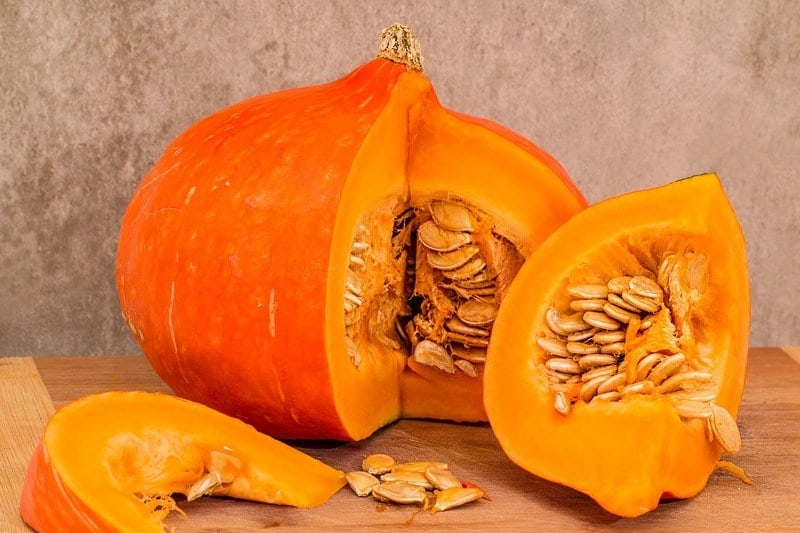
The Health Benefits of Pumpkin for Dogs
Pumpkin is a pretty nutritious food. It even appears alongside tomatoes and blueberries on some “superfood” lists. So, it shouldn’t be surprising that it provides a number of health benefits to those who eat it (whether they have two feet or four).
Some of the most notable health benefits pumpkin is known to provide your dog include:
- It regulates the digestive tract (more on this in a minute)
- It can promote heart health
- It can help promote weight loss
- It can help regulate blood sugar levels
- It supports immune function
- It helps support brain function
The first four benefits are primarily due to the amount of fiber in the fruit, but it is pumpkin’s antioxidants that help to support your dog’s immune system and brain.
Pumpkin also provides a number of health benefits for humans, and although these have yet to be conclusively demonstrated in canines, your dog may enjoy these benefits too. Some of the most notable include:
- It may promote urinary health
- The seeds may help eliminate some parasites
- It may reduce the chances of some cancers
Using Pumpkin to Treat Dog Diarrhea
Pumpkin is clearly a great snack to add to your dog’s diet, but it’s most commonly used by dog owners in a pseudo-medicinal context.
Canned pumpkin puree is a remarkably effective, affordable, and safe treatment for occasional canine diarrhea.
Just mix in a teaspoon to a tablespoon’s worth (depending on your dog’s size) with some cooked chicken and rice (or a food prescribed by your vet that’s specifically designed to support gastrointestinal health) whenever he is suffering from doo-doo-rhea.
Pumpkin puree is essentially autumn-flavored fiber, so it will help slow down your dog’s digestive tract. It’ll also help absorb a lot of the fluid in your dog’s intestines and firm up her stool.
Obviously, you’ll want to contact your vet if your dog’s diarrhea doesn’t resolve within a couple of days, or if she exhibits any other troubling symptoms, including obvious signs of pain, lack of appetite, or bloating.
Pumpkin Quantities: How Much Is Too Much For a Dog?
It’s hard to say how much pumpkin is safe for your dog to eat.
Talk to your vet if you decide to make pumpkin a regular part of your dog’s diet and follow his or her advice. Individual dogs may have unique needs or issues that will influence how much pumpkin is appropriate for your pup.
There isn’t anything toxic about pumpkin, so it shouldn’t poison your dog. It is, however, loaded with fiber. And while a reasonable amount of fiber is great, excessive amounts can be very hard on your dog’s intestines (and, potentially, your carpet).
To be on the safe side, start slowly.
Give your pooch about a tablespoon’s worth of pumpkin (perhaps a bit less if you have a tiny dog) and see how her body reacts over the next 24 hours or so. If she tolerates this well, you can gradually increase the amount you give her.
You probably won’t ever want to let her have more than a few tablespoons a day, but again, let your vet set an upper limit.
Again, be sure to feed pumpkin in moderation, as too much will cause your dog some intestinal distress, but it is usually fine to feed your pup the odd slice from time to time.
In fact, you may even want to keep a can of pureed pumpkin on hand for when your pet’s digestive system stops working the way it should. I always do!
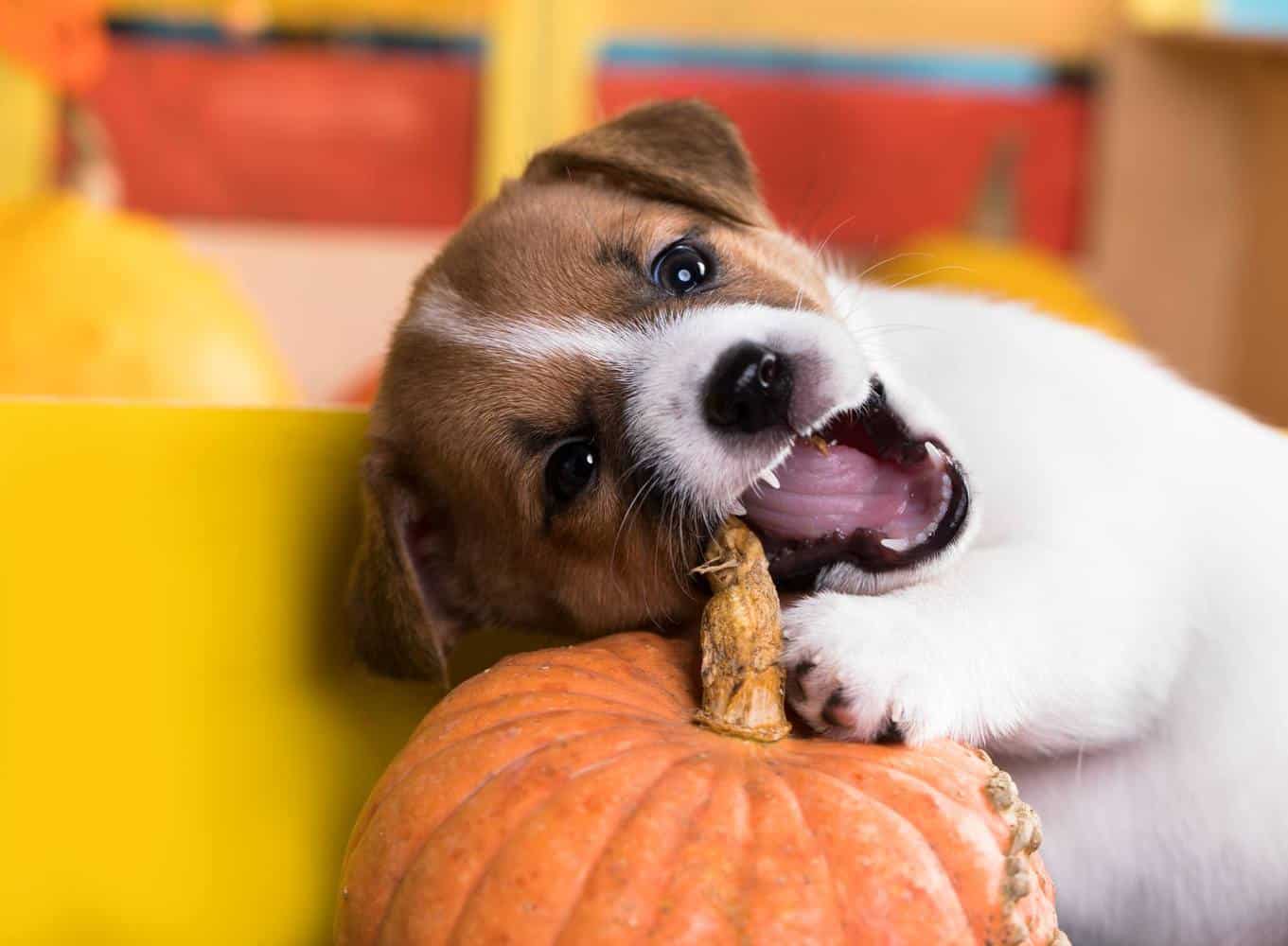




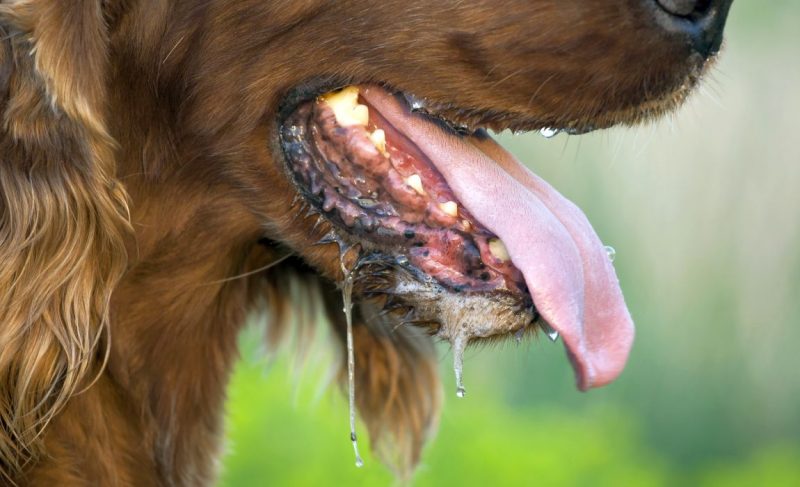
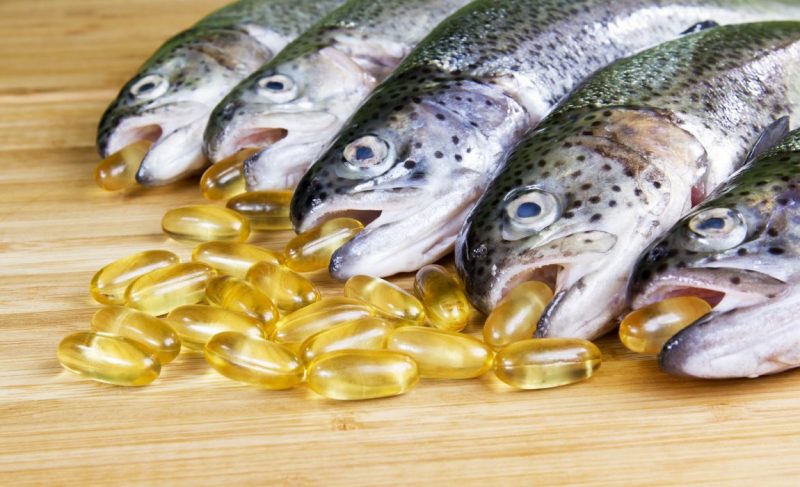
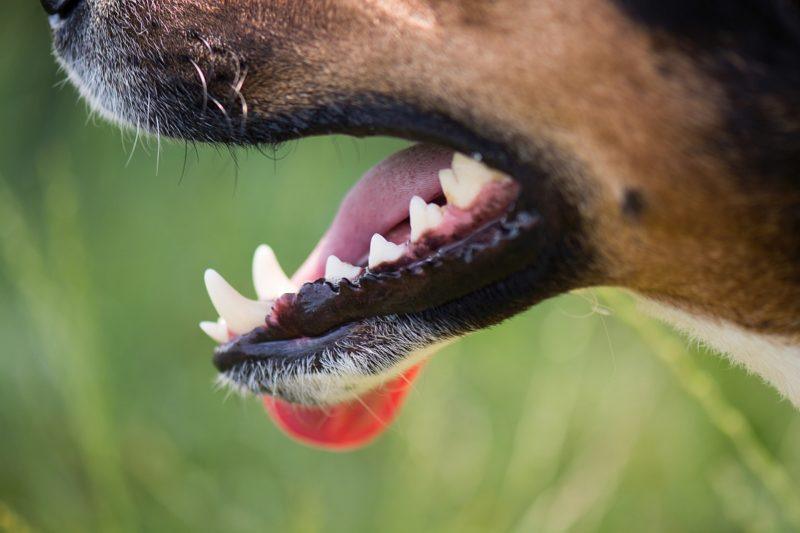

Leave a Comment